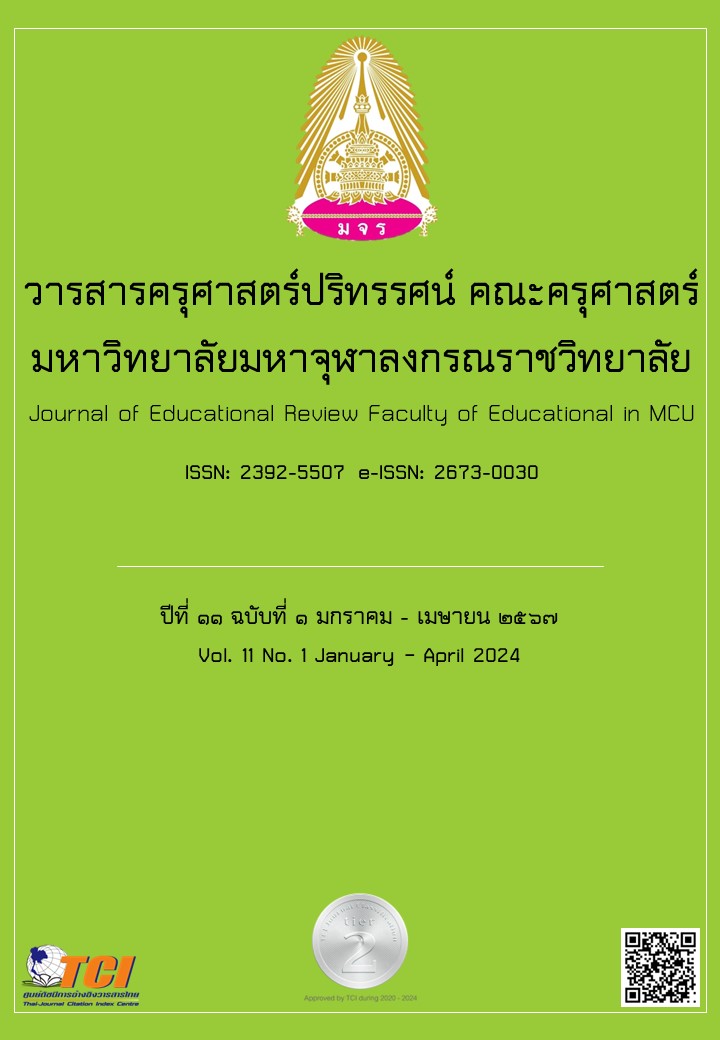USING GAMIFICATION TO DEVELOP ENGLISH VOCABULARY LEARNING ABILITY FOR MATHAYOMSUKSA 1 STUDENTS
Main Article Content
Abstract
The purposes of this research were to: 1) develop English vocabulary learning ability for Mathayomsuksa 1 students by using gamification and 2) study Mathayomsuksa 1 students’ satisfaction towards English vocabulary learning by using gamification. This research was an quasi-experimental research based on one-group pretest-posttest design. The research instruments were: 1) lesson plans of English vocabulary learning by using gamification 2) the pre-test and post-test for English vocabulary 3) a satisfaction questionnaire towards English vocabulary learning by using gamification. The statistics used to analyze the data were mean, standard deviation (S.D.) and t-test for dependent samples. The research results were: 1) The students’ English vocabulary learning ability by using gamification were significantly higher than before at the .05 level. 2) The students’ satisfaction towards English vocabulary learning by using gamification were at high level.
Article Details

This work is licensed under a Creative Commons Attribution-NonCommercial-NoDerivatives 4.0 International License.
ทัศนะและความคิดเห็นที่ปรากฏในบทความในวารสารฉบับนี้ถือเป็นความรับผิดชอบของผู้เขียนบทความนั้นเพียงผู้เดียว และไม่ถือเป็นทัศนะและความรับผิดชอบของกองบรรณาธิการ
กองบรรณาธิการขอสงวนสิทธิ์ในการคัดเลือกบทความลงตีพิมพ์และจะแจ้งให้เจ้าของบทความทราบหลังจากผู้ประเมินบทความตรวจอ่านบทความแล้ว
ต้นฉบับที่ได้รับการตีพิมพ์ในวารสารครุศาสตร์ปริทรรศน์ คณะครุศาสตร์ มหาวิทยาลัยมหาจุฬาลงกรณราชวิทยาลัย ถือเป็นกรรมสิทธิ์ของคณะครุศาสตร์ มหาวิทยาลัยมหาจุฬาลงกรณราชวิทยาลัย ห้ามนำข้อความทั้งหมดหรือบางส่วนไปพิมพ์ซ้ำ เว้นเสียแต่ว่าจะได้รับอนุญาตจากมหาวิทยาลัยฯ เป็นลายลักษณ์อักษร
References
กระทรวงศึกษาธิการ. (2551). ตัวชี้วัดและสาระการเรียนรู้ภาษาต่างประเทศ ตามหลักสูตรแกนกลางการศึกษาขั้นพื้นฐาน พุทธศักราช 2551. กรุงเทพมหานคร: โรงพิมพ์ชุมนุมสหกรณ์การเกษตรแห่งประเทศไทย.
จุฑามาศ มีสุข. (2558). การจัดกิจกรรมการเรียนรู้เพื่อเสริมสร้างพฤติกรรมการมีส่วนร่วมของนักเรียนโดยใช้เทคนิคเกมิฟิเคชัน สำหรับนักเรียนห้องเรียนพิเศษวิทยาศาสตร์. วิทยานิพนธ์ครุศาสตรมหาบัณฑิต. มหาวิทยาลัยราชภัฏมหาสารคาม.
ณัฐพงศ์ มีใจธรรม. (2564). การพัฒนาผลสัมฤทธิ์ทางการเรียนภาษาอังกฤษ โดยใช้เทคนิคเกมมิฟิเคชัน (GAMIFICATION) สำหรับนักเรียนชั้นประถมศึกษาปีที่ 5. วารสารศึกษาศาสตร์ มหาวิทยาลัยบูรพา. 32(2). 76-90.
ปลายฝัน รักษ์รงค์. (2565). ผลการจัดการเรียนรู้คณิตศาสตร์โดยใช้แนวคิดเกมมิฟิเคชันร่วมกับการใช้แบบฝึกทักษะออนไลน์ที่มีผลสัมฤทธิ์ทางการเรียนของนักเรียนชั้นมัธยมศึกษาปีที่ 1. วารสารครุศาสตร์ จุฬาลงกรณ์มหาวิทยาลัย. 50(2). doi:10.14456/educu.2022.17
มาเรียม นิลพันธุ์. (2558). วิธีวิจัยทางการศึกษา. นครปฐม: มหาวิทยาลัยศิลปากร.
โรงเรียนศีลาจารพิพัฒน์. (2565). ผลการเรียนของนักเรียนโรงเรียนศีลาจารพิพัฒน์. กรุงเทพมหานคร: โรงเรียนศีลาจารพิพัฒน์.
วรพงษ์ แสงประเสริฐ. (2562). ผลการสอนการอ่านโดยใช้เกมมิฟิเคชันที่มีต่อผลสัมฤทธิ์ในการอ่านภาษาอังกฤษเพื่อความเข้าใจและเจตคติที่มีต่อการสอนอ่านของนักเรียนมัธยมศึกษาตอนปลาย. ในการประชุมเสนอผลงานวิจัยระดับชาติ มหาวิทยาลัยสุโขทัยธรรมาธิราช ครั้งที่ 10. แหล่งที่มา https://ir.swu.ac.th/jspui/handle/123456789/15832 สืบค้นเมื่อ 10 ต.ค. 2565.
แสงระวี ดอนแก้วบัว. (2558). ภาษาศาสตร์สำหรับครูสอนภาษาอังกฤษ. กรุงเทพมหานคร: สำนักพิมพ์แห่งจุฬาลงกรณ์มหาวิทยาลัย.
อุเทน ปัญโญ. (2550). ระเบียบวิธีวิจัย. เชียงใหม่: มหาวิทยาลัยนอร์ท-เชียงใหม่.
Alpino, S. (2017). The Teaching of Vocabulary: A Perspective. Putera Batam University.
Domínguez, A., Saenz-de-Navarrete, J., de-Marcos, L., Fernández-Sanz, L., Pagés, C., and Martínez-Herráiz, J.-J. (2013). Gamifying learning experiences: Practical implications and outcomes. Computers & Education. 63. 380-392. doi: 10.1016/j.compedu.2012.12.020.
Gabe, Z. J., aLinder. (2013). The Gamification Revolution: How Leaders Leverage Game Mechanics. Crush the Competition: McGraw Hill.
Hee, J. P., and Jae, H. B. (2014). Study and research of Gamification Design. International Journal of Software Engineering and Its Application. 8(8). 19-28.
Ian, G. (2013). Play As You Learn: Gamification as a Technique for Motivating Learners. From http://shura.shu.ac.uk/information.html Retrieved October 10, 2022.
Laufer, B. (1996). The Lexical Plight in Second Language Reading: Words You Don’t Know, Words You Think You Know and Words You Can’t Guess. In J. Coady, & T. Huckin (Eds.), Second Language Vocabulary Acquisition: A Rationale for Pedagogy. Cambridge: Cambridge University Press.
Llach, A., and María, P. (2005). The relationship of lexical error and their types to the quality of ESL compositions: an empirical study. Porta Linguarum Revista Interuniversitaria de Didáctica de las Lenguas Extranjeras. doi:10.30827/Digibug.29120.


